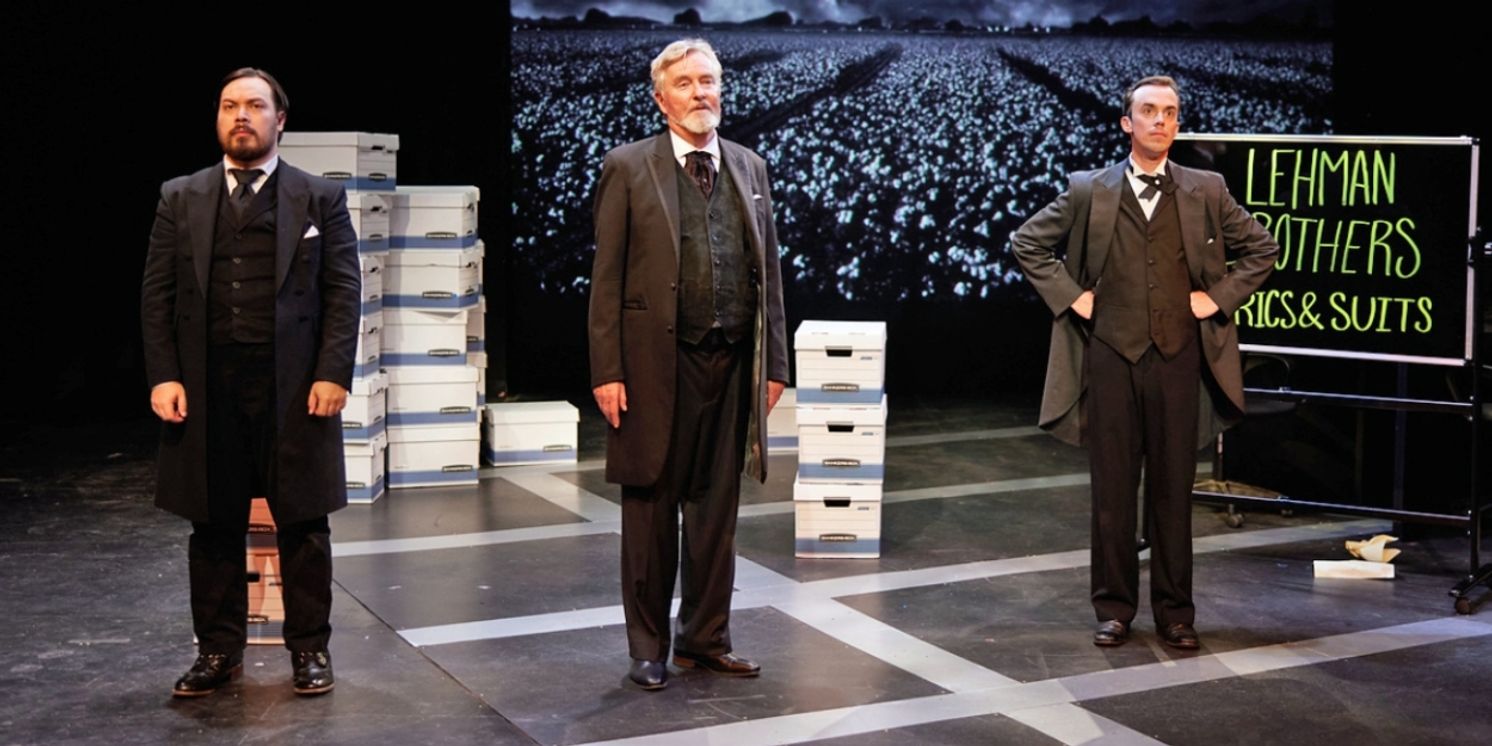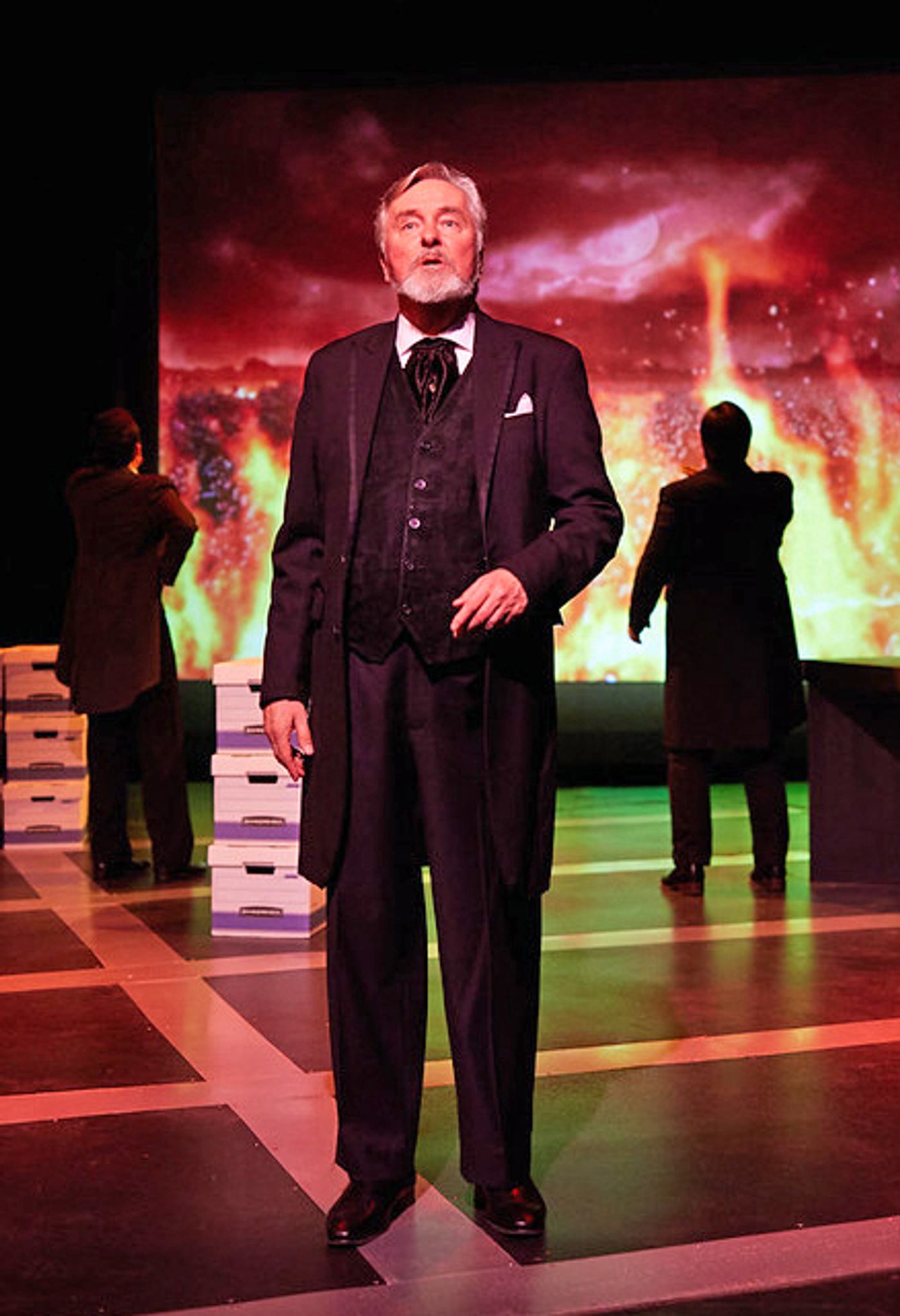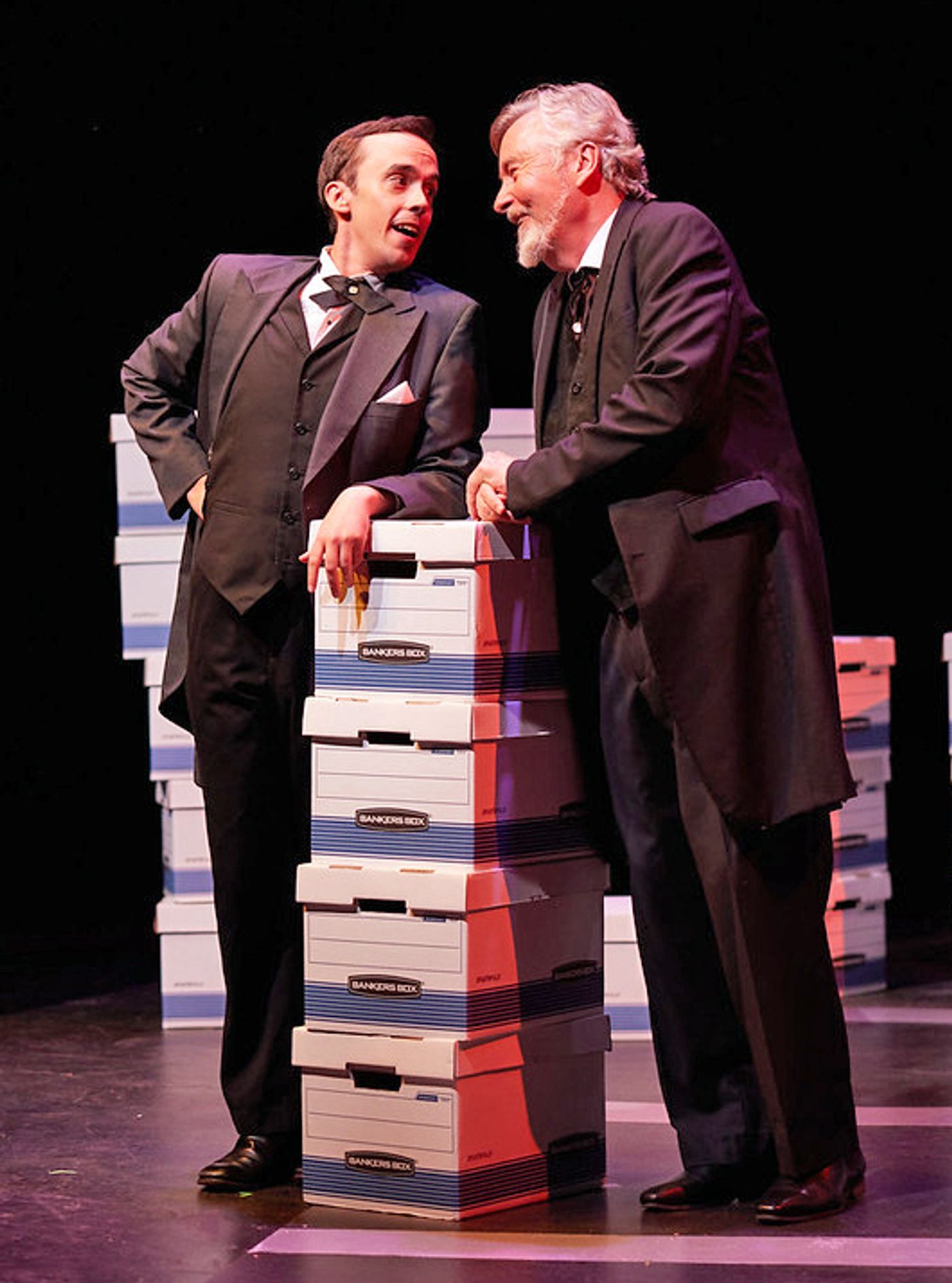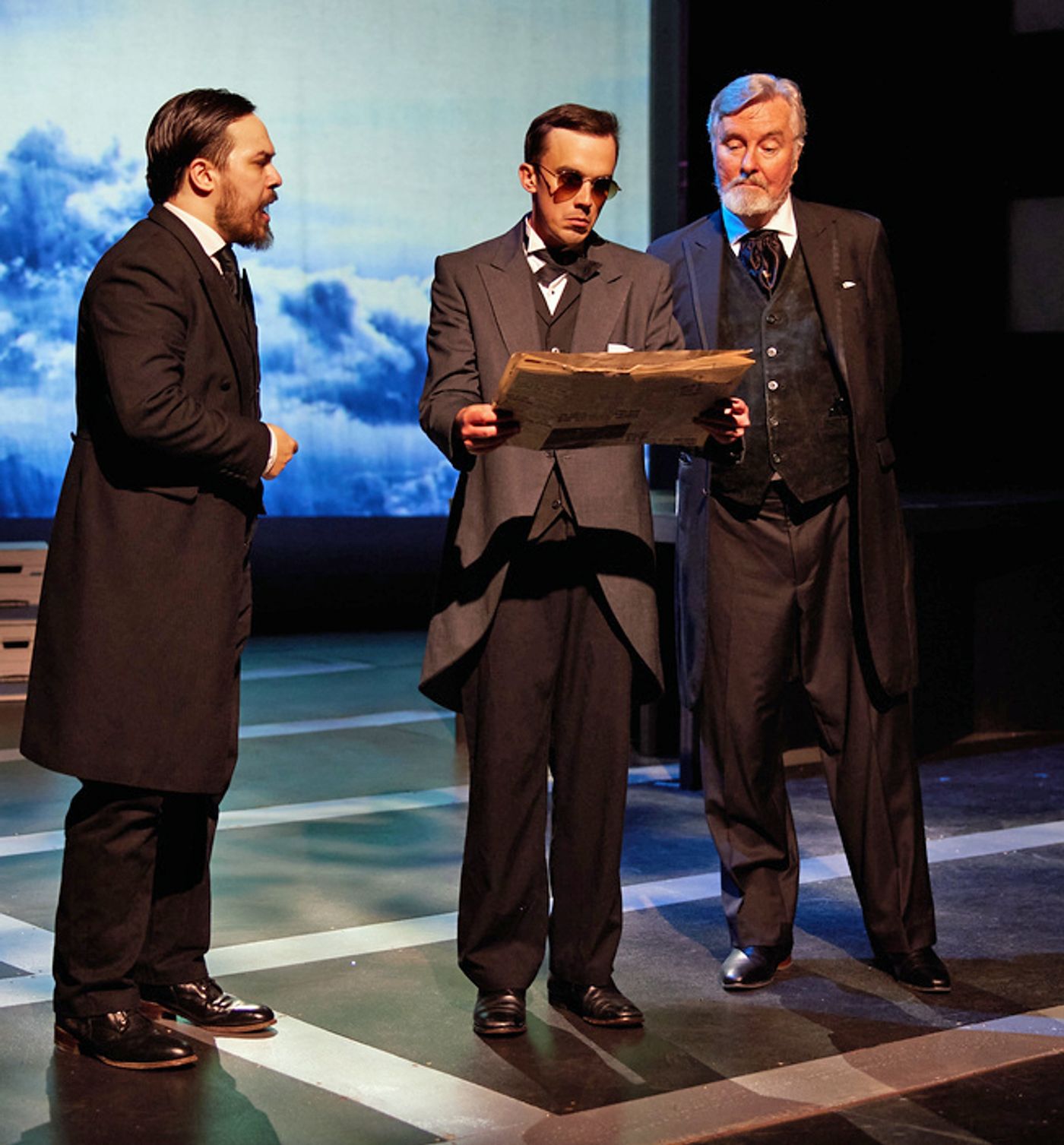Review: THE LEHMAN TRILOGY at Kansas City Actors Theatre
Three German Jewish brothers prosper as their business grows.

The Lehman Trilogy studies the American Dream Mythology as seen through the eyes of Italian playwright and poet Stefano Massini. The English translation by Ben Power transfigures itself into an absorbing and poignant exercise in stellar storytelling as one might imagine it by three brothers around a metaphorical campfire.
This remarkable production of the 2022 Tony Award winner for Best Play is presented by Kansas City Actors Theatre, directed by John Rensenhouse, as the kickoff to the theater’s twentieth anniversary season.
 We remember Lehman Brothers Bank for its spectacular implosion as part of the 2008 real estate and banking panic. Lehman, then the fourth largest U.S. bank, was allowed to die by the George W. Bush administration as the price for saving its three larger siblings.
We remember Lehman Brothers Bank for its spectacular implosion as part of the 2008 real estate and banking panic. Lehman, then the fourth largest U.S. bank, was allowed to die by the George W. Bush administration as the price for saving its three larger siblings.
By November of 2008, the last Lehman family member had not managed the firm for thirty-five years. The collapse, though mentioned, is not what this epic three-hour, three-act presentation is all about. This is about family, coming to America from Bavaria, and the building of successes.
Lehman Trilogy feels like a Viking saga or a Greek epoch appearing through the mist of one hundred sixty years. The audience surprisingly never hopes that this three act, three hour long play will ever end. In itself, this is remarkable.
The original play in Italian featured twelve actors and ran for five hours. The English translation by British writer Ben Power and his organic partner/director Sam Mendes slims down the Massini text by two hours and uses only three characters. Further it adds significant humor to what might have been an exceptionally dark story.
“Lehman” must be a beast for any actor to learn. This production features three super actors with Robert Gibby Brand as oldest brother Henry Lehman, Eric Palmquist as Emanuel Lehman, and W.H. Wilhoit as the youngest brother Meyer (Spud) Lehman. They describe themselves respectively as the “head,” “arm,” and “mediator” of the family.
At the outset, we find ourselves in a twenty-first century boardroom. Banker’s Boxes are strewn about the room. A view of New York appears projected on a screen at the back of the set. We quickly meet the cast, first Henry, then Emanuel, and then Meyer.
Henry Lehman arrives in New York in 1844 in his one good suit and sets up shop as a dry goods merchant in Montgomery Alabama. He is joined soon by his brothers. The business grows in unexpected directions and the brothers end up as “middlemen” and eventually bankers.
The brothers are dressed as businessmen from the early nineteenth century. The boardroom set, a few props, a few hats, multiple whiteboards, and the constant restacking of the boxes are all the three actors have to work with. The three actors play numerous characters of all genders through the years, but we always remember them as the brothers we met in the first few minutes of the play.
It is important to know that these three brothers are German Jews. Whether devout or not, they are bound by their traditions. Blessed be God “Baruch Hashem” is sprinkled throughout their conversation. Whenever someone passes, they observe traditionally. They close business. They rent their clothing. They sit shiva. They recite the Kaddish (the mourner’s prayer).
The direction of the play is more choreography than pure direction. John Resenhouse’s vision of the play is such that it does what is pretty much impossible. It allows the three storytellers to assume various, often humorous personae and keeps our attention with music and moving graphics over this very long time period. Rensenhouse is fortunate to have three such fine actors to push around the stage. It is certainly a heavy lift. Often, one actor will stand out in such a production. These three are so perfectly balanced that they all stand out.
“The Lehman Trilogy” has been criticized by American critics who moan over a lack of remorse over America’s original sin, slavery or the lack of damnation of the American capitalist system. These critics forget that the lens through which these German Jewish brothers are viewed is Italian. Massini sees the American Mythos in the way we once would have liked to see ourselves. There is no reason that Massini should feel responsible for a crime in which he could not have participated.

I have been struck by my research on Massini that he has turned himself into something similar to an Italian Mark Twain in recent years. He gives staged readings of written works. His most recent tour examines Sigmund Freud. He has become a frequent talking head on Italian TV on a number of subjects including the post World War II influence on Italy and fascism.
As a boy, a young Stefano acted out. In response, the Catholic elder Massini enrolled him in a Jewish day school in Florence, Italy. This accounts for the Jewish influences in much of his writing.
Recently, I’ve been doing research on the sources of antisemitic tropes. Of course, I went back to the source; Hitler’s famous handbook, Mein Kamph. One of Hitler’s earliest and most horrific references to the Jews includes a universal accusation that they make nothing in his view except to profit off the labor of others. They are middle men. The middle man accusation surfaces in the Lehman Trilogy. The second brother describes himself as such when asking a planter for his daughter's hand. The question looms over whether or not being a middle man is acceptable in our society.
Massini's next play, scheduled for production this fall, is an examination of “Mein Kamph.”
The Hitler book is horrific as was his reign, but Massini’s fascination with the monster recalls the Spanish philosopher Santayana. Santayana is credited with the axion: “Those who cannot remember the past are condemned to repeat it.”
I cannot recommend “The Lehman Trilogy” highly enough. For pure craftmanship, it is worth an evening of your time. The Lehman Trilogy runs on City Stage inside Union Station through June 9. Tickets are available online at www.kcat.org or by telephone at 816.361.5228.
Photos by Brian Paulette and Kansas City Actors Theatre
Reader Reviews
Videos

